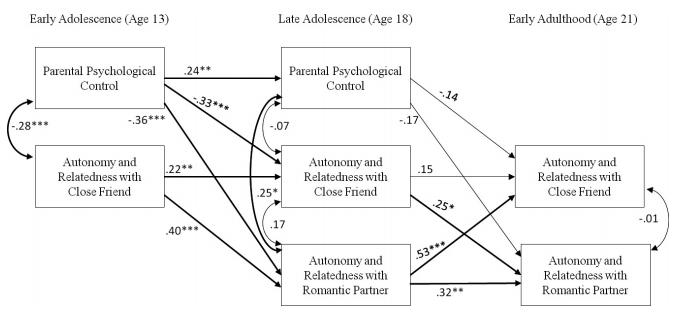Parenting and autonomy and relatedness
Parenting style affects how autonomous and related children will feel.
Self-determination theory has shown that individuals, throughout their lives, have needs for autonomy, competence and relatedness. Simply put, the more their needs are fulfilled, the better individuals feel and function. Past research has shown that the degree to which parent support the fulfillment of these needs the more adapted and well-functioning their children will tend to become (read more). When parents use an authoritative and controlling parenting style, their children's development is likely to be hampered to some degree. Examples of such a controlling parenting style are: use of controlling language, emphasis on punishment ànd reward, use of threats, arousing guild and anxietym and using contingent parental regard and affection.
Two of the basis psychological needs were played a key role in a longitudinal study by Barbara Oudekerk et al (2014) of Virginia University. Data were gathered of 184 individuals when they were 13, 18, and 21 years old. One of the constructs measured in the study was parent psychological control (for an example of the type of items used to measure this construct see here). The researchers hypothesized that the more parents used psychological control techniques such as creating guild, and anxiety and withdrawing affection when children behave bad), the less autonomous and related children would feel as they grew up. And that is what they found. The figure below summarizes the finding (see the negative correlations between parental psychological control and autonomy and relatedness):
Self-determination theory has shown that individuals, throughout their lives, have needs for autonomy, competence and relatedness. Simply put, the more their needs are fulfilled, the better individuals feel and function. Past research has shown that the degree to which parent support the fulfillment of these needs the more adapted and well-functioning their children will tend to become (read more). When parents use an authoritative and controlling parenting style, their children's development is likely to be hampered to some degree. Examples of such a controlling parenting style are: use of controlling language, emphasis on punishment ànd reward, use of threats, arousing guild and anxietym and using contingent parental regard and affection.
Two of the basis psychological needs were played a key role in a longitudinal study by Barbara Oudekerk et al (2014) of Virginia University. Data were gathered of 184 individuals when they were 13, 18, and 21 years old. One of the constructs measured in the study was parent psychological control (for an example of the type of items used to measure this construct see here). The researchers hypothesized that the more parents used psychological control techniques such as creating guild, and anxiety and withdrawing affection when children behave bad), the less autonomous and related children would feel as they grew up. And that is what they found. The figure below summarizes the finding (see the negative correlations between parental psychological control and autonomy and relatedness):


Comments